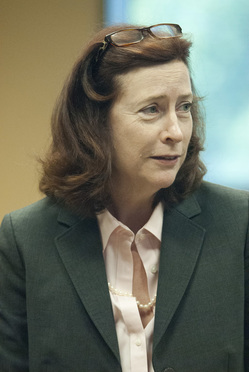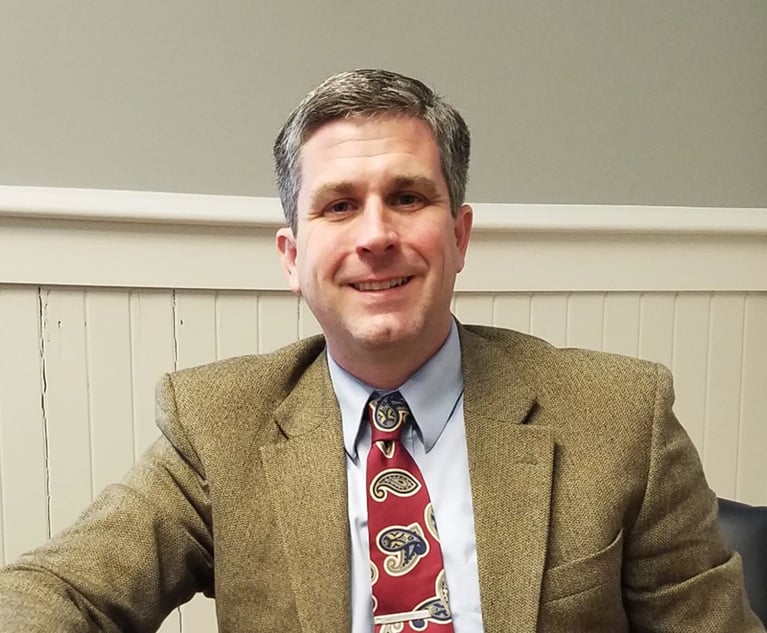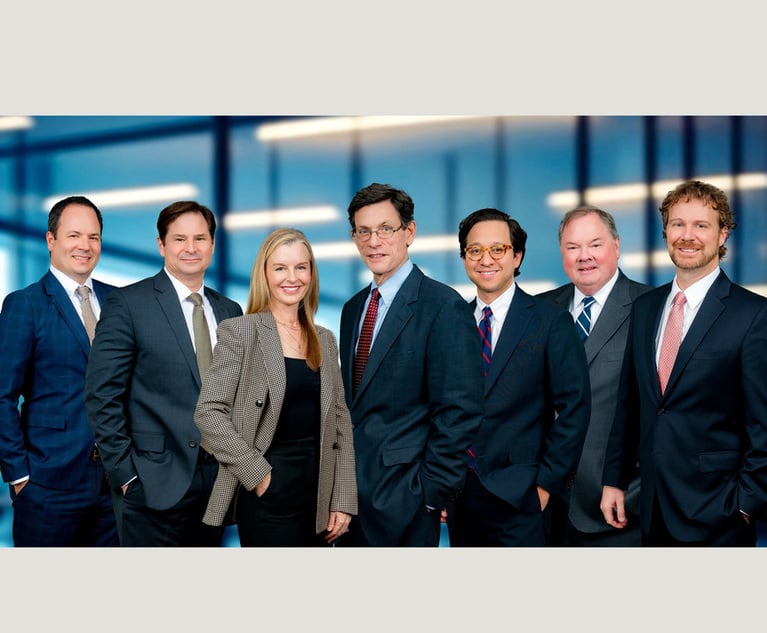What Judges Are Saying About Oral Arguments
Appellate attorneys say the opportunity to argue their cases in person is useful, especially for complex matters and important questions of law.
December 13, 2017 at 11:51 AM
12 minute read

(This is the third part in a series of four articles looking at the decline in oral arguments.)
While making oral arguments in state and federal courts for many years, Laurie Webb Daniel has also been talking with judges about the importance of hearing them.
Daniel is chair of Holland & Knight's national appellate team and leader of the firm's Atlanta litigation practice. She's also a member of the American Academy of Appellate Lawyers, a prominent national group that has been making the case for oral arguments. Daniel has participated in panel discussions with lawyers and judges to discuss the topic.
“The answer that I've been hearing from judges is that, in most cases, it doesn't change their mind. It may help to explain the case, help them write an opinion. But in most cases, it doesn't really change their mind,” she said. “However, a number of judges have said there are some cases where it does make a difference. The critical question then is what criteria they use in determining whether to grant oral arguments.”
And the answer to that question is still evolving.
Daniel's group has collected thoughts in a white paper titled: “Wither Oral Argument? The American Academy of Appellate Lawyers Say Let's Resurrect It!'
“The Academy puts great value on oral argument,” the report said. “Oral argument is, after all, the only time where a party and its advocate can interact with the decision-maker.”
The percent of appeals decided after the benefit of oral arguments rather than on the briefs alone has declined nationally in federal appeals courts. Statistics available on the U.S. Courts website show that 20 years ago, 40 percent of all cases were decided with the benefit of oral arguments, rather than on the briefs alone. By 2006, that percentage had dropped to 25 percent. By 2016, the most recent numbers available show the figure had dropped to 16 percent.
The Eleventh Circuit in Atlanta—which handles appeals for Alabama, Georgia and Florida—among the lowest. The Eleventh Circuit heard oral arguments for 30 percent of its cases in 1996, 16 percent in 2006 and 7 percent in 2016.
Daniel said she has not noticed that decline in her own practice.
“That's because most of what I get is high stakes,” she said.
Her opposing counsel in many of those high stakes cases—a $35 million verdict against Six Flags Over Georgia over an attack outside the theme park, for example—agreed with her on that point.
“I have not seen a downtick in the willingness of Georgia courts to hear oral arguments,” said Michael Terry of Bondurant, Mixson & Elmore.
Even at the Eleventh Circuit, Terry said he believes the judges generally grant oral arguments in complex matters and important questions of law—“the cases where they really need arguments.”
He added, “It's not the dollars at stake; it's the complexity of legal issues that should determine whether arguments are necessary.”
Terry said it's important for lawyers to look judiciously at their own requests and be specific about the need.
“Quite frankly, I think we owe some duty to the system not to request oral argument when it's not necessary,” he said.
Craig Jones of the Orlando Firm said he changed his mind about requesting oral arguments in 2015 when the Georgia Court of Appeals overturned a $1.6 million verdict he had won at trial. Jones said he believed he made one mistake: failing to ask.
“I learned a big lesson here,” Jones said after the reversal. “I did not ask for oral argument because the appellant didn't ask for oral argument.”
That had been his policy for his 29 years of practice. Jones said he had believed an old adage that said you can't win at oral arguments, but you can lose.
After the reversal, he said, “If you are convinced of the correctness of your position, you should not give up any opportunity to discuss it.”

(This is the third part in a series of four articles looking at the decline in oral arguments.)
While making oral arguments in state and federal courts for many years, Laurie Webb Daniel has also been talking with judges about the importance of hearing them.
Daniel is chair of
“The answer that I've been hearing from judges is that, in most cases, it doesn't change their mind. It may help to explain the case, help them write an opinion. But in most cases, it doesn't really change their mind,” she said. “However, a number of judges have said there are some cases where it does make a difference. The critical question then is what criteria they use in determining whether to grant oral arguments.”
And the answer to that question is still evolving.
Daniel's group has collected thoughts in a white paper titled: “Wither Oral Argument? The American Academy of Appellate Lawyers Say Let's Resurrect It!'
“The Academy puts great value on oral argument,” the report said. “Oral argument is, after all, the only time where a party and its advocate can interact with the decision-maker.”
The percent of appeals decided after the benefit of oral arguments rather than on the briefs alone has declined nationally in federal appeals courts. Statistics available on the U.S. Courts website show that 20 years ago, 40 percent of all cases were decided with the benefit of oral arguments, rather than on the briefs alone. By 2006, that percentage had dropped to 25 percent. By 2016, the most recent numbers available show the figure had dropped to 16 percent.
The Eleventh Circuit in Atlanta—which handles appeals for Alabama, Georgia and Florida—among the lowest. The Eleventh Circuit heard oral arguments for 30 percent of its cases in 1996, 16 percent in 2006 and 7 percent in 2016.
Daniel said she has not noticed that decline in her own practice.
“That's because most of what I get is high stakes,” she said.
Her opposing counsel in many of those high stakes cases—a $35 million verdict against Six Flags Over Georgia over an attack outside the theme park, for example—agreed with her on that point.
“I have not seen a downtick in the willingness of Georgia courts to hear oral arguments,” said Michael Terry of
Even at the Eleventh Circuit, Terry said he believes the judges generally grant oral arguments in complex matters and important questions of law—“the cases where they really need arguments.”
He added, “It's not the dollars at stake; it's the complexity of legal issues that should determine whether arguments are necessary.”
Terry said it's important for lawyers to look judiciously at their own requests and be specific about the need.
“Quite frankly, I think we owe some duty to the system not to request oral argument when it's not necessary,” he said.
Craig Jones of the
“I learned a big lesson here,” Jones said after the reversal. “I did not ask for oral argument because the appellant didn't ask for oral argument.”
That had been his policy for his 29 years of practice. Jones said he had believed an old adage that said you can't win at oral arguments, but you can lose.
After the reversal, he said, “If you are convinced of the correctness of your position, you should not give up any opportunity to discuss it.”
This content has been archived. It is available through our partners, LexisNexis® and Bloomberg Law.
To view this content, please continue to their sites.
Not a Lexis Subscriber?
Subscribe Now
Not a Bloomberg Law Subscriber?
Subscribe Now
NOT FOR REPRINT
© 2025 ALM Global, LLC, All Rights Reserved. Request academic re-use from www.copyright.com. All other uses, submit a request to [email protected]. For more information visit Asset & Logo Licensing.
You Might Like
View All
On The Move: Squire Patton Boggs, Akerman Among Four Firms Adding Atlanta Partners
7 minute read

Justice 'Weaponization Working Group' Will Examine Officials Who Investigated Trump, US AG Bondi Says

Trending Stories
- 1Parties’ Reservation of Rights Defeats Attempt to Enforce Settlement in Principle
- 2ACC CLO Survey Waves Warning Flags for Boards
- 3States Accuse Trump of Thwarting Court's Funding Restoration Order
- 4Microsoft Becomes Latest Tech Company to Face Claims of Stealing Marketing Commissions From Influencers
- 5Coral Gables Attorney Busted for Stalking Lawyer
Who Got The Work
J. Brugh Lower of Gibbons has entered an appearance for industrial equipment supplier Devco Corporation in a pending trademark infringement lawsuit. The suit, accusing the defendant of selling knock-off Graco products, was filed Dec. 18 in New Jersey District Court by Rivkin Radler on behalf of Graco Inc. and Graco Minnesota. The case, assigned to U.S. District Judge Zahid N. Quraishi, is 3:24-cv-11294, Graco Inc. et al v. Devco Corporation.
Who Got The Work
Rebecca Maller-Stein and Kent A. Yalowitz of Arnold & Porter Kaye Scholer have entered their appearances for Hanaco Venture Capital and its executives, Lior Prosor and David Frankel, in a pending securities lawsuit. The action, filed on Dec. 24 in New York Southern District Court by Zell, Aron & Co. on behalf of Goldeneye Advisors, accuses the defendants of negligently and fraudulently managing the plaintiff's $1 million investment. The case, assigned to U.S. District Judge Vernon S. Broderick, is 1:24-cv-09918, Goldeneye Advisors, LLC v. Hanaco Venture Capital, Ltd. et al.
Who Got The Work
Attorneys from A&O Shearman has stepped in as defense counsel for Toronto-Dominion Bank and other defendants in a pending securities class action. The suit, filed Dec. 11 in New York Southern District Court by Bleichmar Fonti & Auld, accuses the defendants of concealing the bank's 'pervasive' deficiencies in regards to its compliance with the Bank Secrecy Act and the quality of its anti-money laundering controls. The case, assigned to U.S. District Judge Arun Subramanian, is 1:24-cv-09445, Gonzalez v. The Toronto-Dominion Bank et al.
Who Got The Work
Crown Castle International, a Pennsylvania company providing shared communications infrastructure, has turned to Luke D. Wolf of Gordon Rees Scully Mansukhani to fend off a pending breach-of-contract lawsuit. The court action, filed Nov. 25 in Michigan Eastern District Court by Hooper Hathaway PC on behalf of The Town Residences LLC, accuses Crown Castle of failing to transfer approximately $30,000 in utility payments from T-Mobile in breach of a roof-top lease and assignment agreement. The case, assigned to U.S. District Judge Susan K. Declercq, is 2:24-cv-13131, The Town Residences LLC v. T-Mobile US, Inc. et al.
Who Got The Work
Wilfred P. Coronato and Daniel M. Schwartz of McCarter & English have stepped in as defense counsel to Electrolux Home Products Inc. in a pending product liability lawsuit. The court action, filed Nov. 26 in New York Eastern District Court by Poulos Lopiccolo PC and Nagel Rice LLP on behalf of David Stern, alleges that the defendant's refrigerators’ drawers and shelving repeatedly break and fall apart within months after purchase. The case, assigned to U.S. District Judge Joan M. Azrack, is 2:24-cv-08204, Stern v. Electrolux Home Products, Inc.
Featured Firms
Law Offices of Gary Martin Hays & Associates, P.C.
(470) 294-1674
Law Offices of Mark E. Salomone
(857) 444-6468
Smith & Hassler
(713) 739-1250






